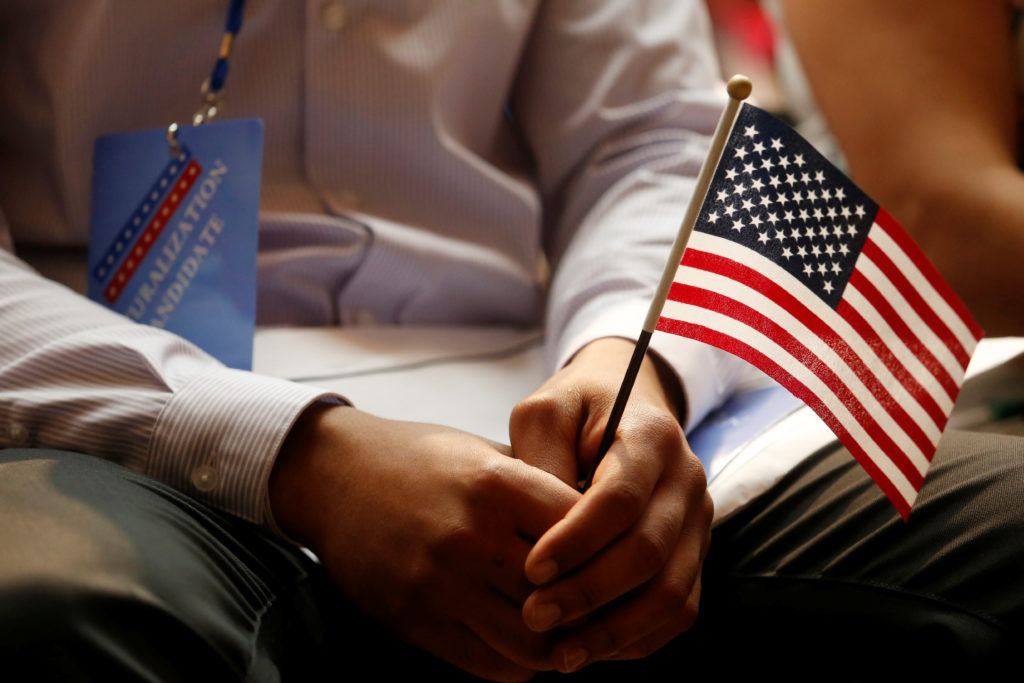The Trump administration is scaling back public benefits for immigrants who are in the U.S. legally, but doing so may negatively affect the health and wellness of young American citizens, according to analysts.
On Monday, Ken Cuccinelli, acting director of the Citizenship and Immigration Services office, told reporters during a White House press briefing that this policy “encourages and ensures self-reliance and self-sufficiency” for those who want to settle permanently in the U.S.
Anyone who relies on one or more publicly funded social safety net benefits, such as Medicaid or food stamps, is known as a “public charge.” According to the rule, which is built off a 1996 law passed by Congress, if an immigrant applies for citizenship or a green card and is determined to be a public charge, that person could have their request rejected.
More than 266,000 comments were submitted during the open comment period that started in September. According to the final rule, most of the comments opposed the idea of applying the public charge rule when weighing an immigrant’s application.
Immigration advocates say this rule will stifle immigration into the country. And while the Trump administration says the rule is aimed at protecting benefits for American citizens, this rule appears to place young U.S. citizens — the children of immigrants — at risk.
The PBS NewsHour asked immigration and health experts to describe what these changes will mean for immigrants and their families and their access to health care and nutrition.
What does the Trump administration plan to do?
The new rule goes into effect on Oct. 15. At that time, immigrants submitting new applications for a green card or citizenship would be penalized for enrolling in public benefits, with certain exceptions made for active-duty military, their families and children. These benefits include:
- Supplemental Nutrition Assistance Program, or food stamps (excluding Women, Infants and Children nutrition program)
- Most forms of Medicaid (excluding use by immigrants who are younger than age 21 or pregnant)
- Section 8 Housing Assistance
- Section 8 Project-based Rental Assistance
According to this rule, an immigrant will be designated as a “public charge” if that person “receives one or more designated public benefits for more than 12 months in the aggregate within any 36-month period.”
“We expect people of any income to stand on their own two feet,” Cuccinelli said on Monday.
The president echoed that language in a White House statement that said the rule will “preserve our social safety net for vulnerable Americans, and uphold the rule of law.”
“To protect benefits for American citizens, immigrants must be financially self-sufficient,” the statement said.
Under the new rules, if an immigrant who is living in the U.S. legally receives both food stamp benefits and Medicaid benefits in a single month, that counts as two months of benefits. An immigrant’s age, work, income status, health, and skills will be taken into consideration when weighing their application for a green card or citizenship. When government officials process those applications, they will also consider whether the applicant “is more likely than not at any time in the future to become a public charge.”
The Department of Homeland Security said it “will not consider benefits received on behalf of another.” That means that if a child who is a U.S. citizen receives benefits and lives in the same household as an immigrant parent applying for their green card or citizenship, that child’s benefits will not count against the parent.
Who will be affected?
More than half of all family-based green card applicants could be denied under this new rule, according to a study estimate published in September, and nearly 200,000 spouses would not be legally admitted into the country.
The change is also expected to crater health and nutrition participation among immigrant families with children who are U.S. citizens and thereby legally entitled to receive services, according to the Kaiser Family Foundation. More than 19 million children live with an immigrant parent in the United States. That’s one out of four children nationwide, the foundation reported, and most of these children — 86 percent — are citizens.
This rule will dramatically change the lives of immigrants and the course of immigration to the U.S., said Ali Noorani, who directs the nonpartisan National Immigration Forum.
“Immigration officers will have the authority to punish immigrants for accessing services they are legally eligible for,” Noorani said to the PBS NewsHour. “The chilling effect will be much more widespread. It will undermine the health and well-being of families that include U.S. citizens.”
There are early signs that this is already happening. According to a recent report from the Urban Institute, researchers interviewed immigrants about what the public charge rule meant to them, and how they were adapting. Immigrants “most commonly” avoided signing up for SNAP benefits and Medicaid because of the rule, the report said.
While Cuccinelli and the White House said the rule will only affect new applicants who receive public benefits starting in October, families are already withdrawing from their benefits out of fear and confusion about the rule.
Before the finalized rule was announced Monday, the National WIC Association, which advocates for state offices that oversee the federally funded USDA program that offers food and health care services to pregnant and postpartum women, as well as infants and young children who face food insecurity, said they had already seen “a staggering number of reports” of women and their U.S. citizen children dropping out of the WIC program.
“Women and their children are now forsaking vital nutrition assistance, education, and breastfeeding support out of the fear of consequence to their legal status,” the association wrote in a letter it submitted as a comment to the new rule. “This alarming trend persisted even when the proposed rule was unveiled without any consequences to an applicant’s legal status for participating in WIC.”
As many as 2 million children who are citizens may be disenrolled from Medicaid and the Children’s Health Insurance Program due to parents’ fears of having their own green card or citizenship application rejected, according to analysis from the Kaiser Family Foundation.
Research suggests children who need and have access to Medicaid and food benefits perform better in school, are healthier overall, and are better positioned to help their households be more financially secure, said Kelly Whitener, an associate professor of practice at the Georgetown University McCourt School of Public Policy’s Center for Children and Families.
“A family might want to hold back on using those benefits [because of the new rule], and in so doing, they might be jeopardizing the future income, health and productivity of their family,” she said. “If I were in those shoes, I can’t imagine who you would decide what to do.”














